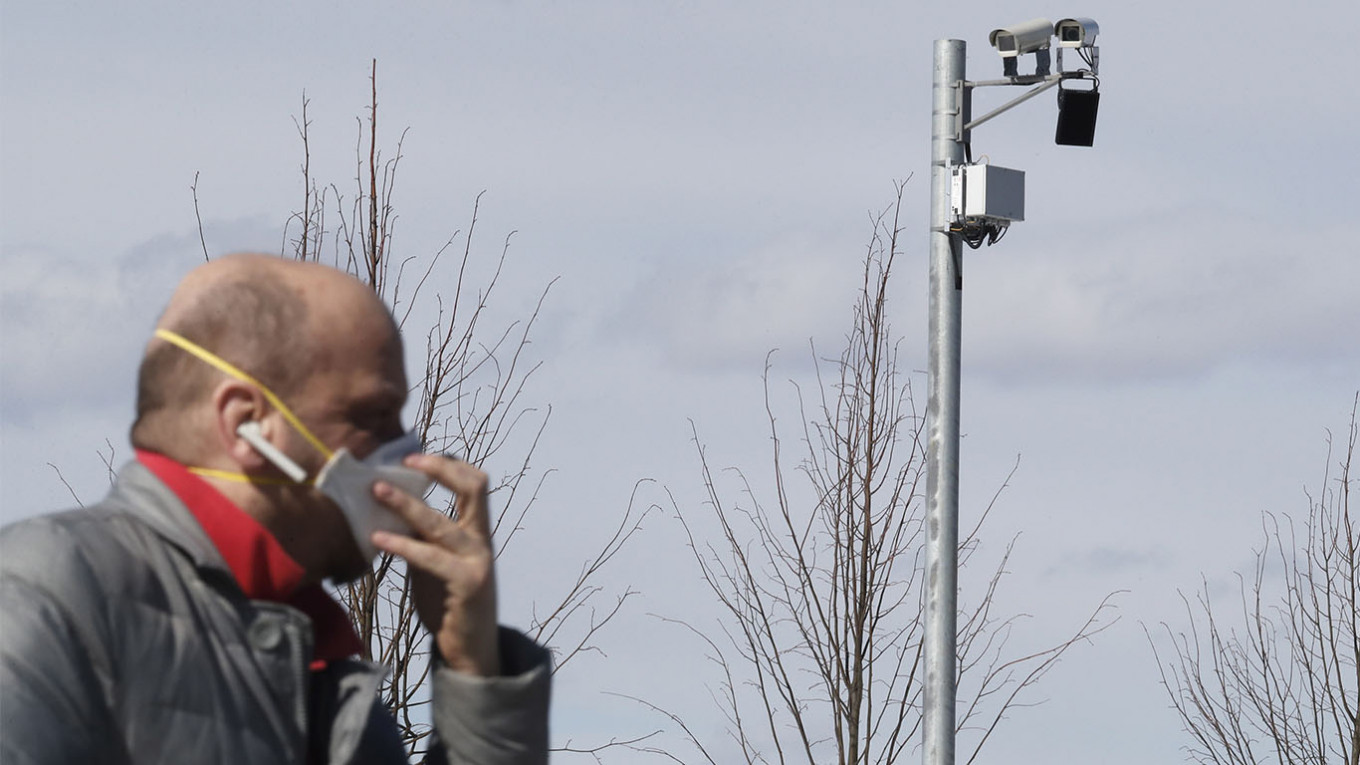After a slow and hesitant start, the Kremlin has taken drastic measures to battle the coronavirus.
It has made the Moscow region — the country’s most populated area — the testing ground for anti-virus political, social engineering and technical solutions. The idea is to test things out and replicate them all over the country if they’re successful.
This was a conscious and calculated move: While Putin put himself into self-isolation after a brief visit to a Moscow hospital, all powers were delegated to the Moscow regional level. It’s up to the Moscow city authorities to devise the rules, and up to the Moscow department of the Interior Ministry to enforce them. Nationwide federal agencies like the FSB and the Emergency Situations Ministry are nowhere to be seen.
Given a free hand by Putin, Moscow mayor Sergei Sobyanin started by introducing an almost complete lockdown in the capital. To enforce it, he decided to enlist a whole range of high-tech solutions.
First, a city-wide system of facial recognition cameras, which have already been installed in the Moscow metro. Then there was talk of QR codes for every trip outside. And finally, full and unrestricted cooperation with mobile operators should help trace people’s movements and spot them if they leave designated areas.
An old-fashioned physical element of control is in operation too. The city government can rely on Moscow’s 70,000-strong police department, along with Russian Guard in Moscow and its suburbs, the Dzerzhinsky division in Balashikha, the 33rd Peresvet Regiment of Special Purpose on Leningradsky Prospect and the 21st Brigade in Sofrino. All of them are patrolling Moscow's streets.
But the two-month-long slew of bad news about the coronavirus has had such an effect that there are very few people who dare to show up on the streets of the capital anyway. And that poses an existential challenge to Sobyanin’s approach.
Since Monday, Moscow has been a showcase for how responsible citizens should treat self-isolation and social distancing in uncertain and dangerous times. The streets are almost completely deserted, except for lonely cyclists delivering food to apartments, cars have become a rare sight with traffic down 70%, according to Yandex, even though driving cars has not been prohibited yet.
That means that the expensive surveillance toolkit being designed and updated in such haste by the city authorities is to deal with very few potential troublemakers, less than 5% of the populace of a giant megapolis. Is it really worth the effort?
In terms of addressing the pandemic, it’s clearly not. The Moscow authorities never intended to put 100% of the populace under lock and key. Sobyanin’s officials had already started creating a system of special passes for privileged categories, including government officials and bureaucrats of all kinds along with people who actually need to move around the city, like policemen and medical staff.
A few determined joggers and walkers would hardly change the picture significantly.
So why waste resources on a few troublemakers? That’s the thing about troublemakers in modern society — be they joggers or political activists — attacking them is a sure and safe way to change the rules society lives by.
You make a rule to eliminate a possibility of a single terrorist entering the country, and it forces everyone to be ready to unblock his or her phone at first request on the border or at the airport. You design a rule to shut down a would-be online hater, and it affects everybody on the Internet because it introduces the idea of censorship.
The rules the Moscow government is trying out on Muscovites are here to stay to some degree, for a very long time. At least that’s what history has taught us.
In his excellent book “The Edge of the World. How the North Sea Made Us Who We Are,” British historian Michael Pye lists the effects of the plague on medieval Europe, including the introduction of papers without which nobody could move.
“Travel was always conditional; it could be blocked by war, opened by a bit of corruption. Plague helped to change the conditions of movement around Europe, just as it policed laws about where anyone could live or travel inside England, what she or he was obliged to do for work and for how much pay. Such laws were not just the answer to an emergency, they persisted through the reign of Elizabeth I, into the first years of the nineteenth century. At frontiers, in the fields, plague changed the way a person’s life was checked and trammeled, made it subject to official scrutiny… plague justified the rules that kept a person in their place.”
The pioneer of introducing these anti-plague rules was, Pye claims, the city of Edinburgh, not the king. In other words, they were all the initiative of local city authorities, whose populace was frightened by the disease, and then they were picked up and adopted all over the country. Will it be Moscow this time?
A Message from The Moscow Times:
Dear readers,
We are facing unprecedented challenges. Russia's Prosecutor General's Office has designated The Moscow Times as an "undesirable" organization, criminalizing our work and putting our staff at risk of prosecution. This follows our earlier unjust labeling as a "foreign agent."
These actions are direct attempts to silence independent journalism in Russia. The authorities claim our work "discredits the decisions of the Russian leadership." We see things differently: we strive to provide accurate, unbiased reporting on Russia.
We, the journalists of The Moscow Times, refuse to be silenced. But to continue our work, we need your help.
Your support, no matter how small, makes a world of difference. If you can, please support us monthly starting from just $2. It's quick to set up, and every contribution makes a significant impact.
By supporting The Moscow Times, you're defending open, independent journalism in the face of repression. Thank you for standing with us.
Remind me later.








